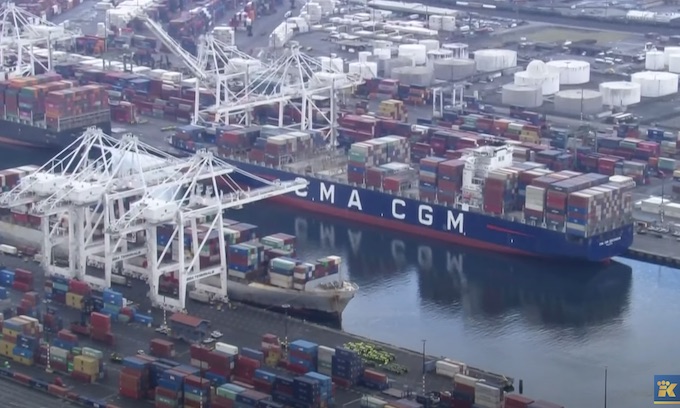A retired U.S. Air Force officer says the persistent supply chain crisis affecting Americans could be giving enemies of the United States valuable insight while also affecting the country’s military readiness.
Global strategist Col. Dan Steiner (USAF-Ret.) tells American Family News there are legitimate concerns about the supply chain that are pertinent to the overall national security of the United States. While there appears to be a demand for goods which outweighs the ability to produce them in a timely manner, he says the circumstance is creating vulnerabilities that America’s adversaries are likely keeping tabs on.
Social unrest
According to the Organisation for Economic Co-operation and Development (OECD), the main transport mode for global trade is ocean shipping, as around 90% of traded goods are carried over the waves. So Steiner argues that it’s likely the Chinese regime is looking for vulnerabilities in the middle of a nationwide supply chain crisis.
“Enemies want to exploit weaknesses,” Steiner explains. “[And] one of the things that adversaries will almost always do is look at events that aren’t necessarily tied to military capabilities.”

For example, the retired military officer suggests that the slow movement of goods into the United States has created a “social strife” that Beijing would recognize as “a fragile part of [U.S.] society” – and could “weaponize” against Americans.
And with a massive shortage of goods around the globe, “[it’s easy to see] the importance of littoral lanes coming out of Asia and how the control of these lanes can impact the rest of the world,” he states. “Imagine if those littoral lanes were closed and ships weren’t even allowed to sail in our direction.”
Consequently, he contends it has become “critical to [the country’s] survival” that the U.S. keep littoral lanes open for trading.
Military repercussions
A fractured supply chain could also have a substantial impact on military readiness, according to the retired Air Force officer.
“[When I was a commander], it was essential for me to be able to do my wartime tasking, [which included] getting properly equipped to go to war,” he offers.
While he admits the vast majority of his equipment was supplied by the government, there remained some dependency on “off-the-shelf” items. Batteries, for example, could be one of those simple, commercial items necessary for deployment.
“Any number of products not typically available in a supply room could require commercial purchases,” he explains.
Steiner says it could get “really scary” when a commanding officer has to prepare those under his authority for war in the midst of a supply chain shortage. While it doesn’t affect weapons or ammo, he says, it could have an impact on the availability of other essentials.
“When that process is interrupted for whatever reason, whether by shipping supply or demand, it creates a fiasco that could impact military readiness,” Steiner states. “These seemingly small interruptions rarely resonate up the chain of command.” But it’s a growing problem that needs to be communicated, he adds.
The retired Air Force colonel assumes the Department of Defense is addressing this issue, although not publicly, and asking questions like Have supply shortages affected our ability to go to war? and How can the impact of a supply shortage be negated?
“While most [Americans] will be talking about the nightmare of getting toys at Christmastime,” Steiner says, “the DoD is looking for how supply shortages will impact the U.S. military – and by the time they paint that picture, collectively throughout the Armed Services, it’ll quickly become an extremely classified document.”
Once again, he suggests imagining an adversary closing all littoral lanes.
“What’s being witnessed is a microcosm of what the next type of warfare could be over,” he concludes: “The inability of our nation to receive materials from other parts of the world.”
—-
Copyright American Family News. Reprinted with permission.


















It’s all part of the plan … to destroy the Constitution and this country…. usher in the New World Order. Just cuz I’m paranoid … don’t mean it aint happing! First destroy the local law enforcement… then the military…. then ask the UN… with blue helmets to keep law and order while disarming the public. It’s coming, people… it’s coming. Get ready…. Now!
Correction. ITS NOT paranoia, when they are REALLY DOING THIS!
good point…L.O.L.
Destroy our military, cause the breakdown of society, criminals on the streets and illegal aliens throughout the Country. Definition of Joe Biden’s America, turning our Country communist.
So which Democrat nit wit allowed the Chinese to take control the Panama Canal in 1999? Jimmy Carter of course in the Carter Torrijos treaty of 1978. Those ships backed up on the west coast could not get to Florida as DeSantis offered if the Chinese did not want it to happen. Don’t even mention getting our navy out of the Atlantic to head out for Battle in Asia. Biden and the Democrats idea of the Monroe doctrine is Marylin Monroe singing “Happy Birthday Mr. President” to JFK, updated to Rachel Levine singing it to Biden.
Mayor Pete Buttpeg can’t handle the biological chain—don’t expect any different with the supply chain.
So far, not a SINGLE ONE Of bidens picks for ANY Federal dept head, has been able to DO THE DAMN JOB they were hired for…
It is truly a sad day to have to accept that our excuses for leadership so hate this country and its citizens. They seemingly cannot do enough damage.
Joe Biden and company—Hell isn’t hot enough for your treacherous actions—but its a start.
Under Joe Baide those military supplies won’t really be needed because he won’t be prepared for anything, and he would probably have no intention using it correctly until he’s had his ice cream!
Hell, even WHEN he’s had his ice crea, i still don’t think he’d know what to do with them, let alone allow the military to USE them correctly..
Our traitorous, socialist Democrat Party’s dictatorship at work.
The “Socialist Democrat Party State” political officers, Gestapo, Woke and Cancel Culture are just getting started.
You will obey, be loyal and support the policies of the “Socialist Democrat Party State” or you will be classified as “Enemies of the State”.
The directive comes just days after the National School Boards Association (NSBA) appealed to President Biden for assistance in a letter that claimed incidents of parental opposition to controversial school policies, such as teaching critical race theory to students and imposing mask mandates, “could be the equivalent to a form of domestic terrorism and hate crimes.”
Parent groups and advocates, meanwhile, say the Democrat Party’s Justice Department’s announcement represents a big government power grab specifically intended to silence their voices —
AND now facts are coming out, PROVING that the white house COLLUDED with the NSBA, in WRITING that letter to Garland…
If the supply chain clog didn’t help America’s enemies the Democrats would do something to alleviate the congestion.
we are way to dam dependant on foreign countries for our goods?
trump tried to bring manufacturing back home.
we are being held hostage for goods by our enemies like china.
we were a once mighty industrial country now we are service oriented economy and we have no workers for that.
our manufacturing in america was destroyed by the GREEN movement period dot end of story.